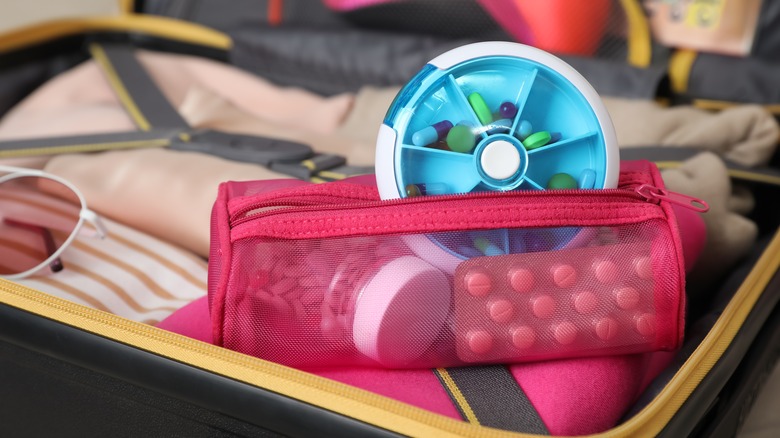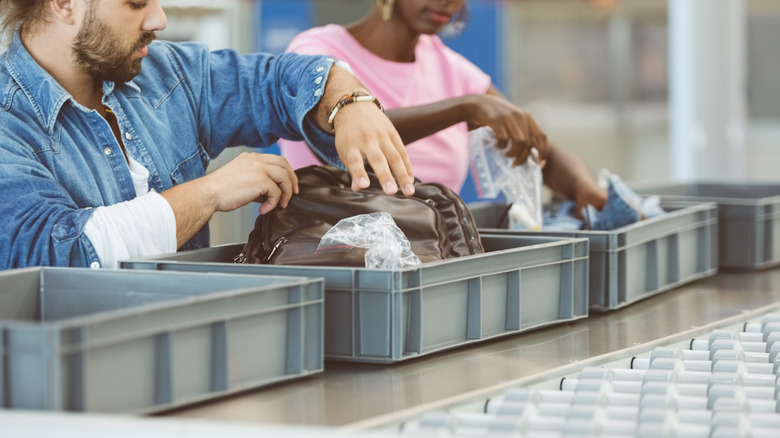Why You Should Think Twice Before Traveling With These Common Medicines
Nearly half of Americans rely on at least one prescription medication, according to the Centers for Disease Control and Prevention. Even more use over-the-counter remedies, such as cold medicine, to treat certain conditions and stave off uncomfortable symptoms. However, not every tablet and capsule found in your bathroom cabinet is allowed in other countries, and trying to bring them along on vacation could land you in serious hot water.
One of the most commonly banned types of medication is narcotics, strong painkillers that may be prescribed by your doctor, such as fentanyl or morphine. Amphetamines, including those used to treat ADHD and narcolepsy, are also prohibited in some countries, as are sedatives (such as sleeping pills and anti-anxiety medications).
Even medicines that appear harmless or are sold without a prescription might not be allowed in your destination country. For instance, birth control pills, insulin, allergy medicines, and supermarket decongestants are restricted in some places. Put simply, though a medicine may be familiar to you, other governments might view it as an illicit or controlled substance and prevent you from toting it across borders.
What could happen if you travel with banned medicines
Packing restricted cold medicine or pain relievers in your luggage would only result in a slap on the wrist, right? Not exactly. If you're lucky, airport security personnel may throw out banned substances and send you on your way without your medicines. If you're less fortunate, however, you could face severe penalties.
In 2015, an American in Japan was arrested for importing oxycodone, a prescription painkiller, into the East Asian country after mailing 57 pills to her hotel room (via The Guardian). She was held for nearly three weeks before being released without charges. While she may have not smuggled the medication in her luggage, the case still shows what can happen when tourists buck the system and attempt to bring illegal substances abroad. The Sun reported a similar story of a woman from the U.K. who was arrested in an Egyptian airport after bringing the narcotic painkiller Tramadol in her suitcase. She was sentenced to three years in prison but was freed after spending 14 months behind bars.
It's crucial to check local laws and restrictions thoroughly before traveling with medicine. Katherine L. Harmon, who oversees health analysis for travel risk management company iJET International, told The New York Times that travelers should consult their destination's embassy to find out which medicines are banned. For medications and supplements that have the OK, be sure to pack them in their original containers with the label provided.
How to obtain medications abroad
Medicine can be useful and even life-saving when treating health conditions, but breaking the law can cause more trouble than it's worth. If your medicine isn't allowed in your overseas destination, work with your physician to find a comparable medicine or see if they can prescribe your usual remedy for an approved reason. "Doctors need to get creative sometimes. Substitutions can allow authorities to accept the drug as a medical need rather than going against the country's religious or moral code," Katherine L. Harmon told The New York Times.
Another option is to nab a prescription after you arrive. Counterfeit drugs are a common issue in some countries, so stick to professional doctors in licensed clinics. For the quickest service, look for an urgent care center in the country you'll be staying in, and during your visit, explain your condition and the medication you usually take (a note from your doctor or pharmacist listing the medicines and their ingredients can also be useful). Keep in mind that they may still refuse to prescribe your go-to drug but might be able to offer an alternative. Be sure to inquire about any possible risks or side effects before switching to the local treatment.
Finally, if a necessary medication is barred in your desired destination and no comparable option is available, consider planning your next vacation to a different spot instead. Your health is a priority, and no trip should get in the way of that.


